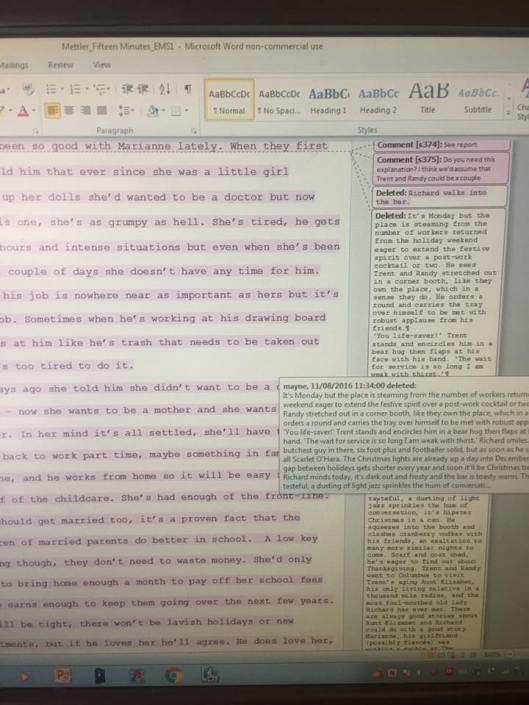Tags
amwriting, anthologies, books, craft, creative writing, criticism, crowdfunding, ediotrs, editing, feedback, Fifteen Minutes, publishing, Rattle Tales, short stories, short story collections, The Brighton Prize, writing
I am currently co-editing an anthology of short fiction. I also supplement my paltry writers’ income with freelance editing projects. I’m not a proof reader; the edits I offer are structural, though I will pick up on any punctuation that has gone awry. Editing is something I enjoy. The idea of helping a writer to perfect their work makes me happy but I also find that editing other people’s work makes me a better writer. Editing not only raises my awareness of common writing pitfalls, it also reminds me to put away the resistance to criticism that all writers experience.
I’ve been lucky enough to have been on the receiving end of dedicated and improving edits for both my books. Uppermost in my mind is my collection of short stories, Fifteen Minutes, which has recently undergone several in-depth edits with Unbound Publishing. This was an amazing learning curve and the book is vastly improved as a result. When the first edit arrived I opened a manuscript which was literally covered in red marks and comments. My editor had forewarned me that this was normal in her email but even so it was quite a shock. I have had short stories edited professionally before, for publication in journals like Rip Tide and The Manchester Review. The editors of those journals did brilliant job and, yes, each manuscript was covered in crossings out, with sentences shifted and lengthy comments inserted. Again, I was a bit shocked by the extent of the mark-ups. For a moment I wondered if the writing was any good after all.
This seems to be a common experience for most writers. When faced with a manuscript covered in mark-ups and comments we tend to take it personally. The self-doubt nags, we mutter things under our breath like, ‘obviously they haven’t read it properly,’ and, ‘they wouldn’t know a joke if it got up and bit them.’ What we forget is that as writers we can become too immersed in a piece to see the flaws and the gaps. The writing is obviously great or it wouldn’t have been selected for publication. However, the editor has read it more closely than anyone else ever will. Their mark-ups don’t mean that the writing isn’t good, just that as the writer we have become too used to what we have written. We think that because we can picture it in our head our readers will be able to too. This is not always the case. If an editor points something out as not being clear, and you have to use a paragraph to explain to them why it is clear, the editor is right and you are not.
Obviously editors are not infallible. This is why they often work in pairs. The first edit of Fifteen Minutes suggested alterations that the second editor then suggested should be changed back. At this point it was up to me to decide which worked best. Often it was the original – but not always – sometimes it was something completely different. You can always negotiate. If you truly believe that your piece is better without the changes, that the reader you have in mind will know exactly what you mean, then go ahead, argue your case. What is interesting is that as you progress in your career you will get comments such as ‘still not clear’ from a professional editor a third or fourth time no matter how much you plead. If this happens you have no choice but to adhere to their suggestion. If you are arguing about the placement of commas and the cutting of single words you are being too precious. Go with what the editor suggests; it’s what they do for a living. They know what they are talking about. The real shock will come when you get your proofs back and realize you know nothing about punctuation!
For further information on my freelance editing services please email erinnamettler@gmail.com I specialize in shaping up short stories for publication or competition but I have edited full-length manuscripts from children’s books to spy thrillers.


I am ashamed to say I already know nothing about punctuation.
LikeLike
Ha! Just you wait 🙂
LikeLiked by 1 person